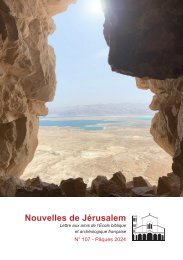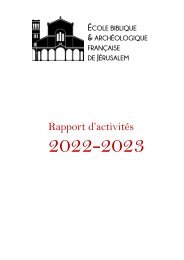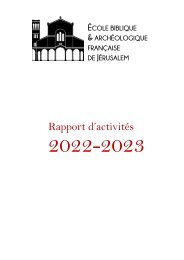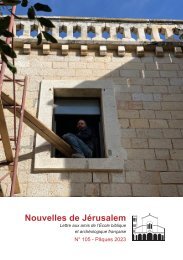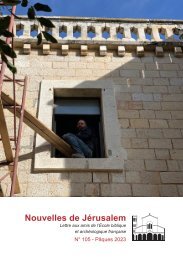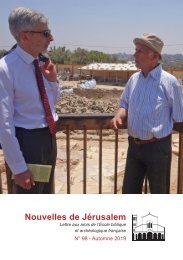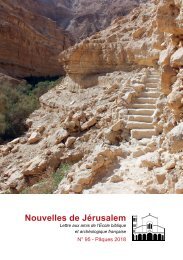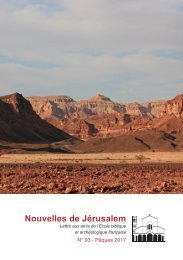NOUVELLES DE JÉRUSALEM - Automne 2017
Les Nouvelles de Jérusalem sont une revue d'informations de l'École biblique et archéologique française de Jérusalem, 2 à 3 fois par an, elles donnent un aperçu des travaux en cours en exégèse comme en archéologie, ici à Jérusalem. En voici le deuxième numéro couleurs en ligne. Les articles alternent français et anglais. The Nouvelles de Jérusalem is an information review of the École Biblique et Archéologique française de Jérusalem, 2-3 times a year, they give an overview of the work in progress in both exegesis and archeology, here in Jerusalem. Here is the second color edition online. Articles are sometimes in French sometimes in English.
Les Nouvelles de Jérusalem sont une revue d'informations de l'École biblique et archéologique française de Jérusalem, 2 à 3 fois par an, elles donnent un aperçu des travaux en cours en exégèse comme en archéologie, ici à Jérusalem. En voici le deuxième numéro couleurs en ligne. Les articles alternent français et anglais.
The Nouvelles de Jérusalem is an information review of the École Biblique et Archéologique française de Jérusalem, 2-3 times a year, they give an overview of the work in progress in both exegesis and archeology, here in Jerusalem. Here is the second color edition online. Articles are sometimes in French sometimes in English.
Create successful ePaper yourself
Turn your PDF publications into a flip-book with our unique Google optimized e-Paper software.
My people perish for lack of the<br />
knowledge. (Hos 4:6)<br />
He will revive us after two days;<br />
on the third day he will raise us<br />
up and we will live before his face.<br />
(Hos 6:2)<br />
Out of Egypt I have called out to my<br />
son. (Hos 11:1)<br />
My heart has turned against me,<br />
my consolations have been kindled<br />
I will not do the heat of my anger...<br />
For I myself am God and not man.<br />
(Hos 11:8-9)<br />
For I desire kindness and not sacrifice,<br />
and knowledge of God rather<br />
than burnt offerings. (Hos 6:6)<br />
Where [is] your judgment, Death?<br />
Where [is] your sting, Hades?<br />
(Hos 13:14)<br />
In compiling as best they could<br />
fourteen chapters of glowing poetry,<br />
the ancient prophet of more than<br />
twenty-eight centuries ago and<br />
those who transmitted him gathered<br />
words that are forever living.<br />
Complaints and threats by the lover<br />
who had been turned away, the<br />
groaning of the deceived and still<br />
smitten husband, the implacable<br />
indictment by the angry judge, the<br />
triumphant blast of the trumpet, the<br />
father’s tender encouragement of<br />
his children – far from the immobile<br />
first mover of Greek philosophy:<br />
this is literally the heart of a passionate<br />
God who pours out his feelings<br />
that are turned upside down with<br />
humanity in these inspired pages.<br />
Collaborative Work<br />
Eugen Pentiuc, who is now professor<br />
of Old Testament and Hebrew<br />
and Associate Dean of Academic<br />
Affairs for Hellenic College and<br />
Holy Cross in Brookline, MA, is<br />
a former student of the ÉBAF. He<br />
did us the favor of joining the research<br />
program from the time it<br />
was launched at the 2006 Catholic<br />
Biblical Association (Fordham<br />
University). As a specialist in Hosea,<br />
he had already published a commentary<br />
on this book in Romanian<br />
in 2001. The impulse given to our<br />
work by Eugen has brought to the<br />
present writing its clearly philological<br />
contour, perseverance in formulating<br />
historical hypotheses throughout<br />
Hosea’s ancient prophecies, and<br />
an emphasis on the present-day relevance<br />
of Hosea’s teaching about<br />
the true personality of God, whose<br />
intimacy with the human being<br />
went even to the incarnation 2 . Three<br />
other translators and philologists —<br />
fr. Łukasz Popko op. (of the Ecole),<br />
fr. Etienne Méténier beat., and Gad<br />
Barnea — made it possible to perfect<br />
the translation by moving to<br />
notes all conjectures concerning the<br />
Hebrew text and by systematically<br />
adding the readings found in the<br />
various versions, while eight other<br />
scholars enriched it with the history<br />
of the book’s reception.<br />
2- cf. Eugen J. Pentiuc, Jesus the Messiah<br />
in the Hebrew Bible, New York / Mahwah,<br />
N.J.: Paulist Press, 2006<br />
14 Lettre aux amis de l’ÉBAF - N° 94 - <strong>Automne</strong> <strong>2017</strong>




